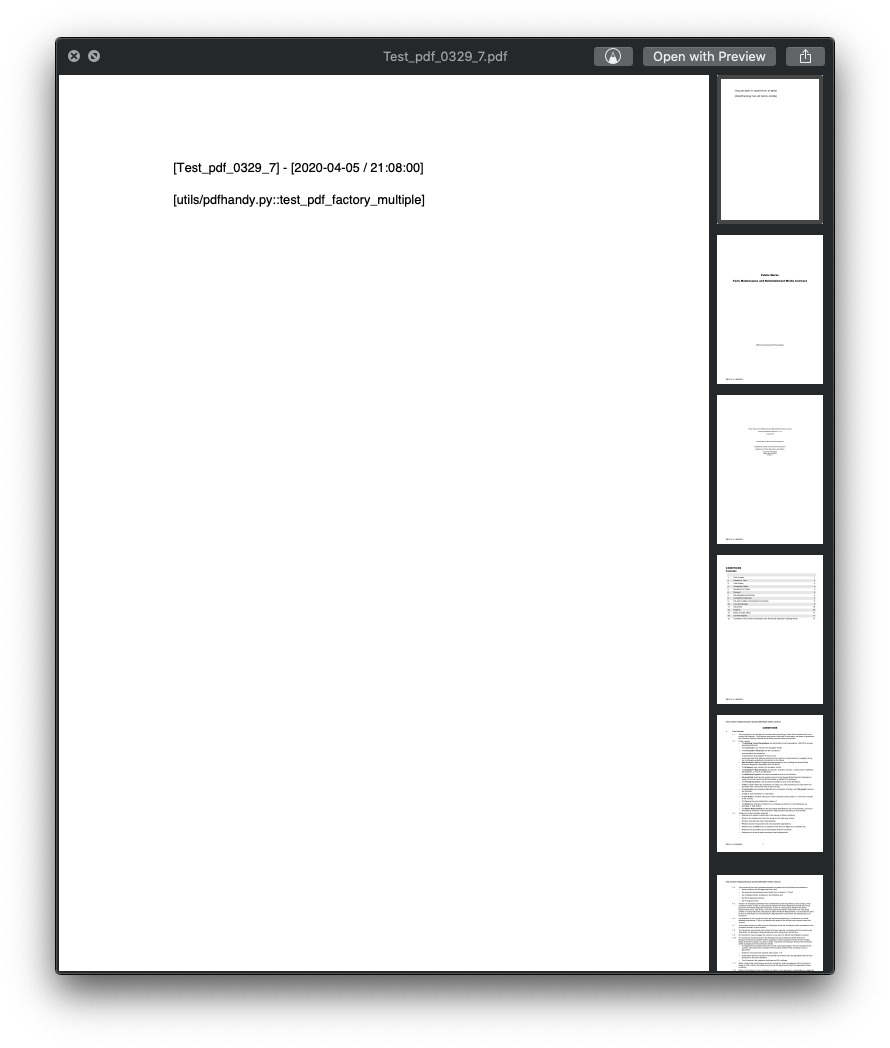GitHub repository: pdfhandy
This is the first article where I finally got courage to share some code from my first Test Automation Project. I started to learn Python and Selenium in November 2019. Since then I managed to write a few test, but most importantly, think I’ve built some kind of foundation for scaling and improving my tests. Probably most satisfying was seeing a steady growth of short snippets which I was creating to understand new concepts and get my feet wet as I learned Python, Pytest, Selenium and other areas.
The code below is something that I tried to Google but found only a few responses on stackoverflow. I used them as a starting point and after 1-2 weeks of hard work and several “a-ha” moments I finally managed to get it work – my own PDF generatorwhich I could use to create “unique” pdf files.
The Goal
I got to a point where I wanted to test the web app file upload process. However the app it does not allow to upload identical files. I used to do it manually: googled pdf file, downloaded as many files as I could and used them in manual tests. Sometimes I also opened file manually, added some short text so that file was then treated as new one. That saved some time but still was quite time-consuming activity.
That’s why I decided to write a small script that would make my life easier. How to automate this process so I could use a simple pdf generator function to create files for my tests?
With this goal in mind I drafted a list of requirements before getting to work:
- -can be run as a fixture before test starts
- -multiple pdf files can be generated and stored in dedicated directory
- -filename is generated in the following format/pattern: “Test_pdf_0318_1.pdf”. Where “0318” is test number, “1” – pdf number within current test
- -files automatically deleted after the test;
- -files automatically archived after test finished
- -base pdf file is used to generate new pdf files; base file can be replaced
- -pdf object (instance of custom PDF class) is returned. Pdf object contains useful information that could be used later in tests to upload file and use this info in assertions: file_time (when pdf was generated), file_date, file_size, file_path, etc.
The structure
I know that my implementation is probably far from good coding practices. However, “practice makes perfect”. That’s why I decided to share it even if it’s ugly and missing some things. At least it does the job I needed.
Here is the structure of the function that I called “pdf_factory”:
- -cleanup
- -generate one-page pdf file containing pdf name, time/date, test-caller
- -merge generated one-page pdf with with base pdf file
- -create PDF instance using PDF class
- -return single pdf or list of PDF objects
Clean up
Clean up simply deletes pdf files generated for previous tests before new test starts. Ideally the cleanup should be done after the test. The “yield” operator would be ideal for this purpose as it allows to run some parts of the script before and after the test. However it didn’t work for me. If I am correct, that’s because in pdf_factory fixture I used the pattern when function returns reference to inner function (I used it to make it possible to use arguments with fixture).
Generate one-page pdf
Once the clean up is finished one-page pdf is generated. The main purposes are to use it later to create “unique” pdf file and also display useful information so that you can easily identify it in you tests. I used “reportlab” for pdf generation. It has lots of methods and it was quite easy to find examples and documentation.
Here is the screenshot:

Merge two pdf files
Now we just need to merge base pdf file and generated one-page pdf with info. This time I used very popular PyPDF2 library. Here is the screenshot of my base pdf file which has 16 pages

Create PDF object
Now it’s time to create PDF object to store some useful information:
class PDF:
file_path = None
file_name = None
file_dt = None
file_date = None
file_time = None
file_num = None
file_pages = None
file_size = None
file_tzoffset = NoneReturn pdf or list of pdf objects
By default “count=1”. This is the parameter in the fixture that defines number of pdf files generated for current test. If count >1 the fixture returns the list of PDF objects. Otherwise – single PDF object. Here is the body of the fixture.
_pdf_factory body
pdf_list = []
pdf = PDF()
cleanup(folder, fname_template, archive_num)
for k in range(1, count+1):
pdf = get_testid_pdf(node, folder, testid_filename, fname_template, k)
pdf.file_path, pdf.file_size = write_merged_pdf(base_files, folder, testid_filename, fname_template, k)
pdf_list.append(pdf)
return pdf if count == 1 else pdf_listBelow is the example of the test that uses pdf_factory fixture. Among with “pdf_factory” fixture, few other fixtures are included in arguments of the test function because we use them in pdf_factory
def test_pdf_factory_multiple(request, current_test_num, pdf_factory):
pdfs = pdf_factory(request.node.nodeid, current_test_num, count=3)
for k, pdf_obj in enumerate(pdfs):
logging.info(f'ITERATION: {k}')
logging.info(f'file_date: {pdf_obj.file_date}')
logging.info(f'file_path: {pdf_obj.file_path}')
logging.info(f'file_size: {pdf_obj.file_size}')
logging.info(f'file_name: {pdf_obj.file_name}')
Here is the output:
-------------------------------- live log call --------------------------------- 19:54:35 INFO pdf.file_num: 0319_1 19:54:35 INFO pdf.file_name: Test_pdf_0319_1.pdf 19:54:35 INFO pdf.file_date: 2020-04-05 19:54:35 INFO pdf.file_time: 19:54:35.308970 19:54:35 INFO pdf.file_tzoffset: 11.0 19:54:35 INFO pdf.file_num: 0319_2 19:54:35 INFO pdf.file_name: Test_pdf_0319_2.pdf 19:54:35 INFO pdf.file_date: 2020-04-05 19:54:35 INFO pdf.file_time: 19:54:35.379654 19:54:35 INFO pdf.file_tzoffset: 11.0 19:54:35 INFO pdf.file_num: 0319_3 19:54:35 INFO pdf.file_name: Test_pdf_0319_3.pdf 19:54:35 INFO pdf.file_date: 2020-04-05 19:54:35 INFO pdf.file_time: 19:54:35.432892 19:54:35 INFO pdf.file_tzoffset: 11.0 19:54:35 INFO ITERATION: 0 19:54:35 INFO file_date: 2020-04-05 19:54:35 INFO file_path: /Users/maksim/repos/p4-python-aerofiler/data/Test_pdf_0319_1.pdf 19:54:35 INFO file_size: 262 19:54:35 INFO file_name: Test_pdf_0319_1.pdf 19:54:35 INFO ITERATION: 1 19:54:35 INFO file_date: 2020-04-05 19:54:35 INFO file_path: /Users/maksim/repos/p4-python-aerofiler/data/Test_pdf_0319_2.pdf 19:54:35 INFO file_size: 262 19:54:35 INFO file_name: Test_pdf_0319_2.pdf 19:54:35 INFO ITERATION: 2 19:54:35 INFO file_date: 2020-04-05 19:54:35 INFO file_path: /Users/maksim/repos/p4-python-aerofiler/data/Test_pdf_0319_3.pdf 19:54:35 INFO file_size: 262 19:54:35 INFO file_name: Test_pdf_0319_3.pdf
Arguments
- node – custom fixture that returns the name of the test so that you can always see what test generated particular pdf file (e.g.”tests/dashboard/test_pdf.py::test_act_table”)
- current_test_num – custom fixture that returns current test number. It uses pytest’s built-in “cache” fixture to store previouse test number
- count – number of pdf files generated for current test. Default value is “1”
- folder – specifies folder used to store pdf files (“data” folder in my case)
- testid_filename – default name for one-page pdf I described above
- base_files – file names that pint to pdf files to merge with one-page pdf . It can be one file or multiple files
- fname_template – pattern that will be used for the names of the generated pdf files
- archive_num = argument that controls how many files will be archived. This can be handy when you do not want delete all files generated in previous tests
def _pdf_factory(node, current_test_num,
count=1,
folder='data', # Default folder: project_dir/data
testid_filename='test_id.pdf',
base_files=('contract_template.pdf',),
fname_template='Test_pdf_',
archive_num=2):Files and project folder structure
Here is how my project folder looks like. “Data” folder servs as a place to store generated pdf files
.
├── LICENSE
├── README.md
├── __pycache__
├── __requirements\ 2.txt
├── conftest.py
├── data
├── pages
├── pytest.ini
├── requirements.txt
├── snippets
├── tests
├── utils
└── venvContents of “data” folder
▶ tree -L 1
.
├── Test_pdf_0319_1.pdf
├── Test_pdf_0319_2.pdf
├── Test_pdf_0319_3.pdf
├── _Test_pdf_0317_1.pdf
├── _Test_pdf_0318_1.pdf
├── contract_template.pdf
└── test_id.pdf
Result
GitHub repository: pdfhandy
